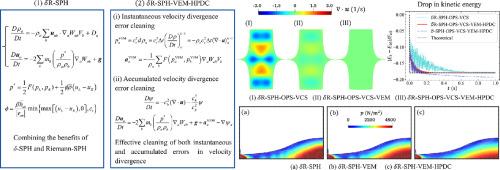DualSPHysics+:增强型 DualSPHysics,提高了精度、能量守恒和连续性方程的分辨率
IF 7.2
2区 物理与天体物理
Q1 COMPUTER SCIENCE, INTERDISCIPLINARY APPLICATIONS
引用次数: 0
摘要
本文介绍了著名的 SPH(平滑粒子流体力学)开源代码 DualSPHysics 的增强版,用于模拟自由表面流体流,即 DualSPHysics+ 代码。在弱可压缩 SPH 形式中模拟不可压缩自由表面流体流时,通过结合稳定性、准确性和能量/体积守恒问题的几种方案进行了增强。优化粒子移动(OPS)方案用于提高自由表面区域粒子移动矢量的精度。为了减少能量耗散并保持一致性,δ-SPH 中的人工粘性被黎曼稳定项所取代,从而产生了 δR-SPH。DualSPHysics+ 采用了速度发散误差缓解(VEM)和体积守恒移动(VCS)方案,以缓解速度发散误差和改善体积守恒,从而提高连续性方程的分辨率。为了进一步减少速度发散的瞬时误差和累积误差,除了 VEM 方案外,还采用了双曲/抛物线发散清理(HPDC)方案。本文介绍了在基于 CPU 和 GPU 的 DualSPHysics+ 代码版本上实施所引入方案的情况,以及编译、运行和计算性能的详细情况。DualSPHysics+ 在精度、能量守恒和收敛性方面的验证通过几个相关基准进行了展示。结果表明,VEM 和 HPDC 的结合可以在瞬时误差和累积误差方面实现更好的速度发散误差清理。同时,通过采用黎曼稳定项,人工粘度造成的过度能量耗散得到了抑制。DualSPHysics+ 增强了连续性方程的分辨率,并改进了能量守恒,从而推进了基于 SPH 的不可压缩自由表面流体流动模拟:DualSPHysics+.CPC 程序库链接到程序文件 https://doi.org/10.17632/xnrfv9pgb5.1.Licensing 规定:GNU 宽通用公共许可证 (LGPL):C++, CUDA.外部依赖性:DualSPHysics (https://dual.sphysics.org)。问题性质:弱可压缩平滑粒子流体力学(WCSPH)方法和开源代码 DualSPHysics 已被广泛应用于模拟自由表面流体流动。一般的 WCSPH 方法和更具体的 DualSPHysics 都需要在几个方面进一步改进,包括虚假压力波动、体积不守恒和过度能量耗散,以提高模拟的准确性和稳定性:DualSPHysics+ 实现了一套数值方案,以提高基于 DualSPHysics 的自由表面流体流动模拟的整体精度、无发散速度场、不变密度场和能量守恒。本文章由计算机程序翻译,如有差异,请以英文原文为准。

DualSPHysics+: An enhanced DualSPHysics with improvements in accuracy, energy conservation and resolution of the continuity equation
This paper presents an enhanced version of the well-known SPH (Smoothed Particle Hydrodynamics) open-source code DualSPHysics for the simulation of free-surface fluid flows, leading to the DualSPHysics+ code. The enhancements are made through incorporation of several schemes with respect to stability, accuracy and energy/volume conservation issues in simulating incompressible free-surface fluid flows within the weakly compressible SPH formalism. The Optimized Particle Shifting (OPS) scheme is implemented to improve the accuracy of particle shifting vectors in the free-surface region. To mitigate energy dissipation and maintain consistency, the artificial viscosity in δ-SPH is substituted with a Riemann stabilization term, leading to the δR-SPH. The Velocity divergence Error Mitigating (VEM) and Volume Conservation Shifting (VCS) schemes are adopted in DualSPHysics+ to mitigate the velocity divergence error and improve the volume conservation, and hence to enhance the resolution of the continuity equation. To further reduce both the instantaneous and accumulated errors in velocity divergence, a Hyperbolic/Parabolic Divergence Cleaning (HPDC) scheme is incorporated in addition to the VEM scheme. The implementations of the introduced schemes on both CPU and GPU-based versions of the DualSPHysics+ code along with details on the compilation, running and computational performance are presented. Validations in terms of accuracy, energy conservation and convergence of DualSPHysics+ are shown via several relevant benchmarks. It is demonstrated that a better velocity divergence error cleaning in both instantaneous and accumulated errors can be achieved by the combination of VEM and HPDC. Meanwhile, the excessive energy dissipation by the artificial viscosity is shown to be suppressed by adopting the Riemann stabilization term. Enhanced resolution of the continuity equation along with improved energy conservation of DualSPHysics+ advance the SPH-based simulation of incompressible free-surface fluid flows.
Program Summary
Program title: DualSPHysics+.
CPC Library link to program files https://doi.org/10.17632/xnrfv9pgb5.1.
Licensing provisions: GNU Lesser General Public License (LGPL).
Programming language: C++, CUDA.
External dependencies: DualSPHysics (https://dual.sphysics.org).
Nature of problem: Weakly Compressible Smoothed Particle Hydrodynamics (WCSPH) method and the open-source code DualSPHysics have been widely applied to simulate free-surface fluid flows. Both the general WCSPH method and the more specific DualSPHysics need further improvements in several aspects, including spurious pressure fluctuations, non-conservation of volume and excessive energy dissipation, to enhance the accuracy and stability of simulations.
Solution method: DualSPHysics+ implements a set of numerical schemes to enhance the overall accuracy, divergence-free velocity field, invariant density field and energy conservation in the simulation of free-surface fluid flows based on DualSPHysics.
求助全文
通过发布文献求助,成功后即可免费获取论文全文。
去求助
来源期刊

Computer Physics Communications
物理-计算机:跨学科应用
CiteScore
12.10
自引率
3.20%
发文量
287
审稿时长
5.3 months
期刊介绍:
The focus of CPC is on contemporary computational methods and techniques and their implementation, the effectiveness of which will normally be evidenced by the author(s) within the context of a substantive problem in physics. Within this setting CPC publishes two types of paper.
Computer Programs in Physics (CPiP)
These papers describe significant computer programs to be archived in the CPC Program Library which is held in the Mendeley Data repository. The submitted software must be covered by an approved open source licence. Papers and associated computer programs that address a problem of contemporary interest in physics that cannot be solved by current software are particularly encouraged.
Computational Physics Papers (CP)
These are research papers in, but are not limited to, the following themes across computational physics and related disciplines.
mathematical and numerical methods and algorithms;
computational models including those associated with the design, control and analysis of experiments; and
algebraic computation.
Each will normally include software implementation and performance details. The software implementation should, ideally, be available via GitHub, Zenodo or an institutional repository.In addition, research papers on the impact of advanced computer architecture and special purpose computers on computing in the physical sciences and software topics related to, and of importance in, the physical sciences may be considered.
 求助内容:
求助内容: 应助结果提醒方式:
应助结果提醒方式:


